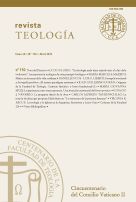Por favor, use este identificador para citar o enlazar este ítem:
https://repositorio.uca.edu.ar/handle/123456789/7324| Título: | La teología y la Iglesia en la Argentina: entrevista a Lucio Gera Theology and Church in Argentina: interview to Lucio Gera |
Autor: | Azcuy, Virginia Raquel | Palabras clave: | TEOLOGIA; IGLESIA CATOLICA; ENTREVISTAS; Gera, Lucio, 1924-2012 | Fecha de publicación: | 2015 | Editorial: | Universidad Católica Argentina. Facultad de Teología | Cita: | Azcuy, Virginia R., La teología y la Iglesia en la Argentina : entrevista a Lucio Gera [en línea]. Teología, 114 (2014). Disponible en: https://repositorio.uca.edu.ar/handle/123456789/7324 | Resumen: | Resumen: La revitalización de la teología en la Argentina comenzó al menos una década antes del Concilio Vaticano II, aunque éste ciertamente encaminó y profundizó las inquietudes pastorales que surgían en ambientes sacerdotales jocistas y luego en otros grupos relacionados con la pobreza. El inmediato posconcilio planteó las preguntas de la aplicación y recepción del Vaticano II en el país, dio lugar a la creación de la Comisión Episcopal para la Pastoral, vio surgir al Movimiento de Sacerdotes para el Tercer Mundo y desafió al Episcopado a pensar la adaptación de Medellín a nuestro contexto, dando lugar al Documento de San Miguel (1969). En estos años intensos, interrumpidos entre 1976 y 1983 por el gobierno militar, se empezó a gestar lo que se llamó “escuela argentina de teología”, un cauce de reflexión o inicio de tradición que fue permeando la pastoral eclesial y la teología académica. La nueva etapa iniciada con el retorno a la democracia encontró una línea de continuidad con la primera fase de recepción, por medio del aporte teológico al Documento Líneas Pastorales para la Nueva Evangelización (1990). La entrevista a Lucio Gera realizada el 12 de marzo de 1999 testimonia que él estuvo entre quienes más aportaron para que el Vaticano II y su finalidad pastoral fuera recibido en nuestro país. Abstract: The renewal of theology in Argentine started at least ten years before the Vatican II, although the latter certainly oriented and deepened the pastoral concerns present among priests of the Young Catholic Workers movement, and later in other poverty- related groups. The early post-council brought up questions about the reception and implementation of the Council in this country; it led to the creation of the Episcopal Commission for the Pastoral and saw the emergence of the Movement of Priests for the Third World. Vatican II challenged the bishops to think the adaptation of Medellín in our context, leading to the Document of San Miguel (1969). In these intense years, which were interrupted by the military coup of 1976 through 1983, “the Argentine school of theology” developed an original line of thought, a tradition that shaped the pastoral care and the academic theology. The new stage, starting with the return to democracy, completed the first phase of reception through the theological contribution of the Document Pastoral Lines for the New Evangelization (1990). Lucio Gera's interview on March 12, 1999 shows him as one of the main contributors to the reception of Vatican II and its pastoral aim in our country. |
Cobertura Espacial: | ARGENTINA | URI: | https://repositorio.uca.edu.ar/handle/123456789/7324 | ISSN: | 0328-1396 | Disciplina: | TEOLOGIA | Derechos: | Acceso Abierto | Fuente: | Teología, Tomo LII, nº 116, 2015 ISSN 0328-1396 |
| Aparece en las colecciones: | TEO - 2015 Tomo LII nro. 116 |
Ficheros en este ítem:
| Fichero | Descripción | Tamaño | Formato | |
|---|---|---|---|---|
| teologia-iglesia-argentina-lucio-gera.pdf | 347,37 kB | Adobe PDF |  Visualizar/Abrir |
Visualizaciones de página(s)
392
comprobado en 27-abr-2024
Descarga(s)
971
comprobado en 27-abr-2024
Google ScholarTM
Ver en Google Scholar
Este ítem está sujeto a una Licencia Creative Commons

